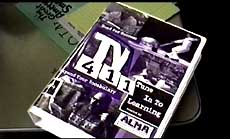|
What is ALMA's
mission and that of TV411?
That
literacy is for everyone. That it's destigmatized. That it is not America's
dirty little secret any longer. That there is a national consensus that
everyone needs who needs literacy gets it and everyone who has literacy
gives it in whatever way they can--helping, tutoring, giving money. Through
mass media I think we can get this idea to become a permanent part of
the American landscape. Lifelong learning is the right of everyone. It
is the job of ALMA to give people an understanding of what needs to be
done and the tools to get it done.
What are the
main goals of adult learners?
The main reasons they
go back to school is to get a better job, to help their kids and to have
an easier time dealing with everyday challenges like applications, leases,
and car payments. Many want to read the bible better. Others want to write
their autobiography. Getting a high school diploma is very important.
Ultimately, it's about achieving dreams, and that is quite different from
individual to individual.
You were part
of the education system in New York for many years. How did that experience
impact the development of TV411?
My students moved me deeply. The ones I worked with were so far
behind academically and usually through no fault of their own. I wanted
to be a wonderful enough teacher to help them catch up. I became very
passionate about teaching and I wanted TV411 to have all the qualities
of the great teachers I have seen and experienced. I think of a teacher
as somebody whose compassion and patience will get you through anything.
Someone who is clear and knowledgeable and patient, but makes you laugh
and can also move you to tears, who is there for you and someone who you
could bring home to your family. The inspiration for this program was
to bring the teacher of my dreams into as many homes as possible.
|
There are a
number of organizations devoted to literacy-why do you think that ALMA
was the first of these to bring television into the fold? What makes this
show different?
Well,
there are a number of wonderful organizations that support our work including
the Literacy Volunteers of America, and Laubach Literacy, but theirs are
not organizations whose essential tool is the media. And we are by no
means the first to use media, Kentucky Educational TV has been using television
to help people pass the GED test for years and is the real pioneer here.
PBS is developing a new program, 'Literacy Link,' their first effort to
reach out to low literate viewers, but their program...is primarilly focused
on job skills and concepts for getting out into the work force. I think
we're the first to make literacy television with mass appeal.
Why is the issue
of adult literacy still considered a taboo topic in our society?
People
still carry around a lot of shame when it comes to adult literacy. Too
often, it's a failure on the part of school system. Everyone knows that
you're supposed to read well and although there seems to be less of a
stigma about people not born in this country who don't read well, the
fact remains that if you were born and raised an American, then people
think reading should be second nature.
*This section was paraphrased from a Feren Communications
Press Release. Contact (212) 983-9898 for more information.
|

